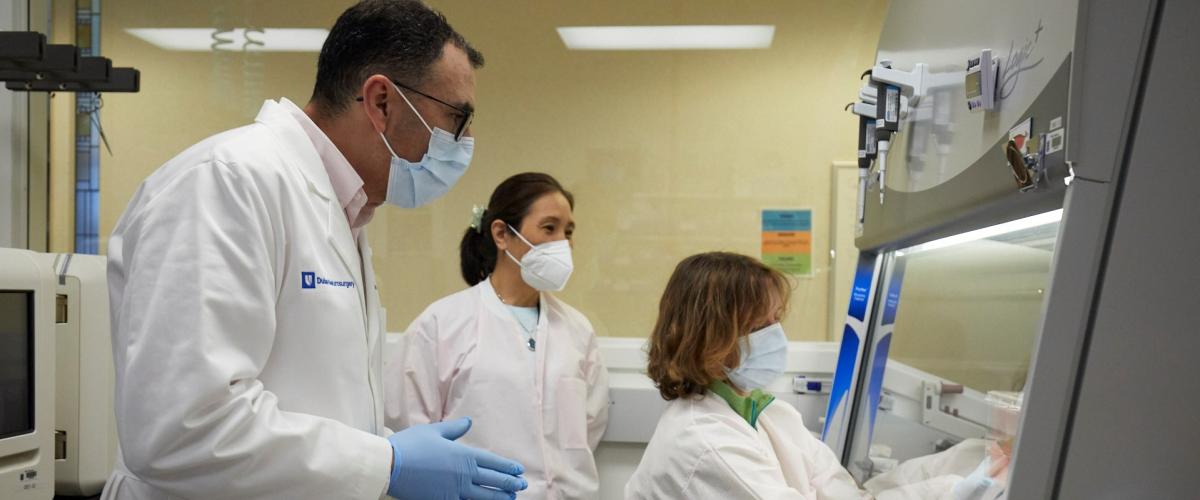
Research Activities and Focus Areas
The Neuro-Oncology Program at The Preston Robert Tisch Brain Tumor Center focuses its research efforts in the following areas:
The only known preventable cause of malignant glioma is exposure to ionizing radiation. A primary goal of the Neuro-Oncology Program is to conduct epidemiology research that can identify additional risk factors that can be targeted for risk reduction and brain tumor prevention. This work also studies genetic predisposition to reveal biologic pathways involved in brain tumor formation and to identify high-risk populations that might benefit from enhanced brain tumor surveillance (Walsh, Ostrom)
It is clear that not only are tumors different from patient to patient (intertumoral heterogeneity), but individual cancer cells within a patient’s tumor are remarkably different and can respond to therapies differently (intratumoral heterogeneity). We use cutting-edge techniques to sequence individual cancer cells in patient tumors to study intratumoral heterogeneity and understand how this impacts treatment response and recurrence. The World Health Organization lists more than 126 types of brain tumors. The Neuro-Oncology Program aims to complete molecular characterization of these tumors through exome (DNA) sequencing and expression (RNA) profiling. These studies seek to identify relevant tumor suppressors and driver oncogenes underlying the growth and progression of each brain tumor type. A new therapy based on this information will be developed, particularly against driver oncogenes. (Patel, López, Gregory, Reitman, Khasraw, Walsh)
The screening of drugs and biological agents for identifying novel therapeutic compounds is a high priority and depends upon developing and maintaining appropriate brain tumor models. Improved in vitro (cellular) and in vivo (mouse) models that recapitulate human brain tumor behavior and molecular biology are done in concert with our Brain Tumor Center Biorepository. This biorepository, in concert with the DCI General Biobank, supports our preclinical research and clinical trials portfolio. The development of improved brain stem glioma, embryonal, and other mouse models that recapitulate the genetic alterations of the human disease to determine the function of novel drivers is an important research area. For example, a K27M histone mutation was described in 80% of high-grade brain stem gliomas in 2012, making it the most common mutation in this brain tumor subtype (M. Waitkus, M. Brown, R. McLendon, K. Walsh, J Sampson, P. Fecci, S. Keir).
Every patient's tumor is different and, therefore, will respond to therapy differently. To understand tumor response to treatment more completely, we take patient tumors and directly transplant them into mice to generate ‘patient avatars’, which are used to study tumor responses. In addition, we have developed a tumor slice culture model in which patient samples are cultured for up to 14 days and can be used to test therapy responses, including assessing how a specific tumor model responds to immune cells isolated from the same patient. (A Patel, K. Hotchkiss, M. Khasraw)
The development of oncolytic virotherapy of primary and secondary CNS tumors with genetically recombinant poliovirus through basic mechanistic and clinical translational studies is a primary research effort. A broad range of research initiatives is being conducted to establish a novel form of cancer immunotherapy based on tumor targeting with poliovirus recombinants with tumor-selective cytotoxicity. (M. Gromeier, M Brown, M. Khasraw, A. Desjardins)
The Duke Brain Tumor Immunotherapy Program has been an international leader in developing peptide and dendritic cell vaccines for decades. Our program includes developing other cellular therapies, from tumor-infiltrating lymphocytes to next-generation armored CAR-T cells. Further, we have developed bispecific T cell engagers that could be administered systemically, along with activated T cells, or even as a secreted factor by CAR T cells to boost anti-tumor responses. Our primary scientific goals are the development of immunological based therapies against gliomas. (J. Sampson, M. Khasraw, P. Fecci)
The development of monoclonal antibodies and fully human, affinity-matured antibody fragments reactive with molecular targets on primary brain tumors for diagnosis and therapy is a current goal. Immunoconjugates with new conjugation technologies for radioisotopes, such as 211Astatine and 177Lutetium, bacterial toxins, and chemotherapeutic agents suitable for treating both primary and metastatic brain tumors, as well as some general systemic cancers from other programs, are being developed. Parallel development of imaging approaches is a high priority. (D. Bigner, V. Chandramohan, G. Vaidyanathan)
An important goal and one of our highest priorities is the design and execution of Phase I, II, and III clinical trials to extend survival and improve quality-of-life for brain tumor patients. Examples of these innovative trials include genetically-modified poliovirus trials, immunotoxin trials, and peptide-based trials. Convection-enhanced delivery with innovative imaging is a high priority. (Khasraw, Desjardins, Fecci, A. Friedman, H. Friedman, Landi, Herndon, Peters, Song, Barboriak, Bonner, Ashley)
This program seeks to collect tissue taken from patients during tumor resection following treatment with various therapeutic agents, including small molecule drugs or immunotherapies. Such studies can provide crucial insights into whether drugs can cross the blood-brain barrier and if they can exert a pharmacodynamic effect at the tumor site. Such a program will allow us to determine if drugs that have failed to demonstrate clinical efficacy are failing due to inadequate access to the CNS or if the biological effect they exert is neutralized by the tumor and its suppressive microenvironment. (M. Khasraw, P. Fecci, A. Patel, K. Singh)
Work conducted within and across these Focus Areas drives progress toward achieving the Neuro-Oncology Program’s Specific Aims:
1) To conduct genomic, epigenomic, and immunologic studies that identify inherited and acquired molecular alterations underlying the development and progression of all major subtypes of adult and childhood brain tumors;
2) To establish innovative and predictive brain tumor model systems for the accurate identification of therapeutic compounds to advance to clinical evaluation;
3) To leverage innate and adaptive immune responses for the development and pre-clinical testing of novel brain tumor immunotherapies;
4) To develop and translate novel therapeutics and supportive care practices into clinical trials, incorporating innovative trial designs and techniques;
5) To leverage, in concert with the DCI, primary brain tumor research expertise to advance the understanding and treatment of metastatic brain tumors.